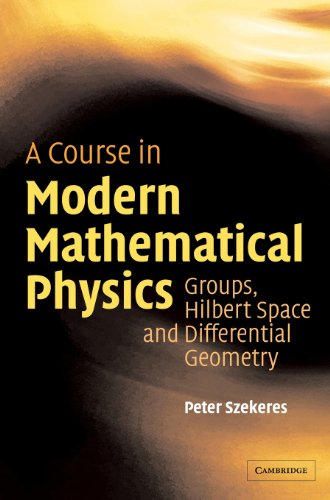 Reddit reviews A Course in Modern Mathematical Physics: Groups, Hilbert Space and Differential Geometry
Reddit reviews A Course in Modern Mathematical Physics: Groups, Hilbert Space and Differential Geometry
We found 3 Reddit comments about A Course in Modern Mathematical Physics: Groups, Hilbert Space and Differential Geometry. Here are the top ones, ranked by their Reddit score.

Used Book in Good Condition
I like Szekeres's A Course in Modern Mathematical Physics for referencing intro-grad-level material. It covers abstract linear algebra, differential geometry, measure theory, functional analysis, and Lie algebras, and teaches you some physics along the way.
More generally, the best "breadth" book on advanced mathematics is Princeton Companion to Mathematics by Gowers et al. and its slightly underachieving younger brother of a companion text, Princeton Companion to Applied Mathematics by Higham et al.. You won't properly learn advanced mathematics this way, but you'll get the bird's-eye view of modern research programs and the math underlying them.
If you want a more algebraic take on Szekeres's program to teach physicists all the math they need to know, check out Evan Chen's Napkin project, which is intended to introduce advanced undergrads (it's perfectly fine for grad students too) to a wide variety of advanced mathematics on the algebra side of things.
Since you're doing probability and statistics, check out Wasserman's All of Statistics and Knill's Probability Theory and Stochastic Processes for good, concise references for intro-grad-level material.
I will second what /u/Ovationification said, though. I didn't really learn anything with the above books, I just use them occasionally for reference or to think about pedagogy.
The links between topology, geometry and classical mechanics are fairly well documented in the other comments. Geometry and topology are fairly important in modern physics, at least what I've seen of it. General Relativity is the main example of where geometric ideas began to enter into physics. A good resource for this is Sean Carroll's GR notes and corresponding book. There are more advanced GR texts as well, like Wald's book.
There are also some books which deal directly with the links between physics and geometry, such as Frankels book, Szekeres, Agricola and Friedrich and Sternberg. Of these I own Szekeres book which is very good, and Frankels looks very good as well. The other two I am not sure about.
Geometric ideas do raise their head in more areas, as an example it is possible to formulate electromagnetism in terms of tensors or the hodge dual (see here). Additionally, and this is a bit beyond my knowledge, a friend of mine is working on topics in quantum field theory involving knot theory. I'm not exactly sure how this works but the links are certainly there.
Sorry if this all has more of a differential geometry flavour to it rather than a topological one, the diff geo side is what I know better. Hope that all helps. :)
Dear OP, I would recommend going through a GR book like Carroll first. Then when you feel like you have a decent enough grasp turn to a mathematical physics book like this one http://www.amazon.com/Course-Modern-Mathematical-Physics-Differential/dp/0521829607/ref=sr_1_1?ie=UTF8&qid=1345340408&sr=8-1&keywords=szekeres
This should give you all you need.